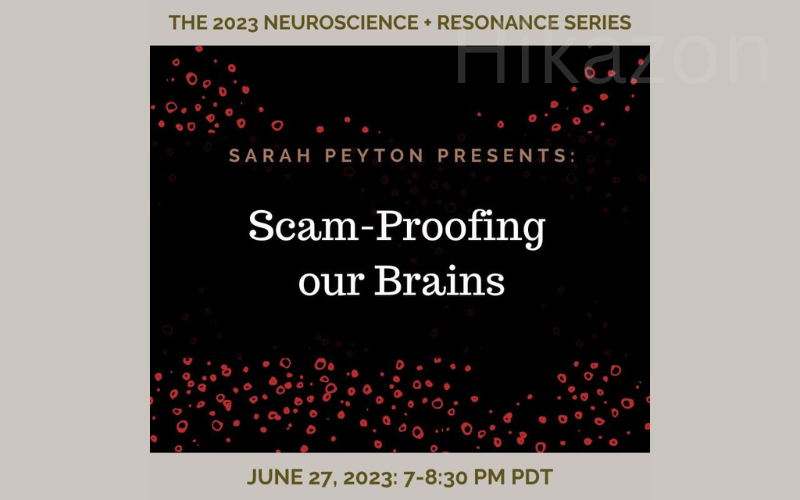Scam-Proofing our Brains By Sarah Peyton
$20.00 $8.00
Scam-Proofing our Brains By Sarah Peyton – Digital Download!
Content Proof:
Scam-proofing our brains by Sarah Peyton: An Insightful Exploration
In a world increasingly dominated by technology and digital communication, the prevalence of scams has surged tremendously. The rapid expansion of online interactions has opened the door for unscrupulous individuals to exploit the vulnerabilities inherent in human psychology. Sarah Peyton’s enlightening session, “Scam-proofing our brains,” delves deep into this critical issue, offering invaluable insights into how our minds work when faced with deception. Over 90 minutes, Peyton explores why some individuals fall prey to scammers and how understanding our cognitive processes can empower us, helping us develop a more resilient mindset against exploitation. With riveting anecdotes and scientific evidence, Peyton crafts an engaging narrative that underscores the importance of self-awareness in the fight against scams.
Understanding the Mechanisms of Deception
The Cognitive Vulnerabilities
At the heart of Peyton’s presentation is the concept that human brains possess inherent vulnerabilities when it comes to deception. This susceptibility can be likened to a soft underbelly, making us particularly prone to manipulation during emotional or stressful situations. When faced with a scam be it a slick email asking for personal information or a persuasive phone call urging us to invest in a dubious opportunity our brains can be hijacked by a rush of emotions. In this state, rational thinking goes out the window, making it easier for scammers to weave their web of deceit.
Research conducted by psychologists highlights several cognitive biases that scammers exploit:
- Confirmation Bias: Individuals tend to notice information that confirms their existing beliefs while disregarding contradictory evidence. Scammers use this to create narratives that appeal to potential victims’ preconceived notions.
- Loss Aversion: People experience losses much more acutely than gains. By presenting a scenario that emphasizes loss (e.g., “You will lose your account if you don’t act immediately”), scammers can trigger immediate reactions that bypass critical thinking.
- Social Proof: When individuals see that many others are participating in an action or believing in something, they are more likely to follow suit. Scammers often leverage testimonials and fake reviews to create an illusion of legitimacy.
Emotional Triggers and Scams
Scams thrive on emotional triggers, manipulating feelings of fear, urgency, and even guilt. Through her session, Peyton emphasizes that recognizing these triggers is critical in scam-proofing our minds. When confronted with a scam, our brains might respond similarly to a threat instinctively moving into a reactive state. This phenomenon can lead us to act impulsively without thoroughly assessing the situation.
The emotional responses often utilized by scammers resonate deeply within us. For instance, threats of blackmail can send our minds spiraling into panic. Our desire to protect ourselves and our loved ones can override our innate skepticism, leading us to make hasty decisions that we later regret. By better understanding these emotional dynamics, we can learn to step back and evaluate situations with a more critical eye.
The Role of Neuroscience in Understanding Scams
Brain Processes at Play
The intersection of neuroscience and psychology is a pivotal theme in Peyton’s work. By examining how various brain processes are triggered during encounters with scams, she provides audiences with concrete tools to combat deceit. Neuroscience reveals that our brain operates through various neural pathways, each associated with different emotional reactions and cognitive processes.
- Amygdala Activation: This small region of the brain plays a crucial role in processing emotions like fear and anxiety. Scammers often aim to trigger the amygdala by inciting fear, thus leading us away from rational thought.
- Prefrontal Cortex Function: Responsible for decision-making and impulse control, the prefrontal cortex can be dampened during high-stress situations. When we feel threatened, our ability to think critically diminishes.
Empowerment Through Knowledge
Peyton’s aim in understanding these processes is to help individuals foster self-resonance. This concept encourages people to check in with their emotions and thoughts, enabling them to create a pause between stimulus and response. By doing so, individuals develop a more resilient mindset, allowing them to recognize scams as they arise and respond appropriately.
Incorporating practical exercises that enhance self-resonance, Peyton gives audiences tools to bolster their defenses against potential manipulation. Techniques such as mindfulness and awareness can help activate the prefrontal cortex, thereby promoting clear thinking even in threatening situations.
Practical Tools for Self-Protective Strategies
Techniques for Scam-Proofing Your Mind
Peyton’s presentation is not just about uncovering vulnerabilities; it’s also about empowerment through understanding. Among the comprehensive tools and strategies shared, the following techniques can significantly aid individuals in safeguarding themselves against scams:
- Mindfulness Practice: Engaging in mindfulness exercises strengthens emotional regulation and promotes self-awareness. Regular practice can ensure you remain grounded during stressful encounters.
- Pause for Reflection: Training oneself to pause and reflect before acting can safeguard against impulsive decisions. Ask questions like, “Is this too good to be true?” or “What would I advise a friend to do?”
- Daily Self-Check-ins: Regularly assessing your emotional state can help identify when you might be more vulnerable to scams. Are you feeling stressed? Frustrated? Acknowledging these feelings can empower you to be more vigilant.
- Educate and Share: By discussing scams and sharing knowledge with friends and family, you create a community that is informed and vigilant. The more familiar we are with the tactics used by scammers, the less power they hold.
Fostering a Resilient Mindset
Peyton’s session fosters a proactive, resilient mindset that can serve as armor against deceit. Drawing parallels between emotional and physical resilience can illuminate the importance of preparation. Just as we might train our bodies for physical challenges, we should also train our minds for emotional encounters. Building emotional strength equips individuals to navigate life’s complexities without succumbing to unethical manipulations.
The journey toward scam-proofing one’s mind is akin to cultivating a garden; it takes time, patience, and consistent care. The fruits of this labor are not only personal protection but also a richer understanding of human psychology and emotional dynamics.
The Future of Scam Awareness
Navigating a Digital Landscape
As the digital landscape continues to expand, so too does the sophistication of scams. What was once a simple email phishing scam is now often a savvy and intricate operation that involves social engineering on multiple levels. The evolution of technology demands a parallel evolution in our awareness and preparedness.
- Emerging Technologies: The rise of artificial intelligence and machine learning has led to the creation of more convincing scams, emphasizing the need for heightened vigilance. Tools such as AI-generated voices can mimic trusted individuals, enacting conversations that can confuse even the most cautious individuals.
- Continuous Learning: Staying informed about new scam tactics through workshops, webinars, and community resources can keep you razor-sharp. Engaging with experts, as Sarah Peyton exemplifies, ensures that critical information is always at our fingertips.
A Call to Action
Peyton’s compelling presentation serves as a clarion call not just for individual awareness, but for collective responsibility. As we navigate a rapidly changing world rife with deception, each person holds the power to influence their circle. By fostering open conversations and sharing valuable insights, we can cultivate a culture of awareness and resilience.
In conclusion, Sarah Peyton’s “Scam-proofing our brains” session is more than just an enlightening exploration of deception; it is an empowering journey. With a wealth of practical strategies, psychological insights, and scientific understanding, individuals are equipped with the tools necessary to deflect manipulation. Empowerment leads to resilience, and recognizing our vulnerabilities can ultimately catalyze a stronger, more aware society. As we move forward in an unpredictable digital future, let us embrace the knowledge shared by Peyton and stand firm against the tactics employed by scammers.
Frequently Asked Questions:
Business Model Innovation: We use a group buying approach that enables users to split expenses and get discounted access to well-liked courses.
Despite worries regarding distribution strategies from content creators, this strategy helps people with low incomes.
Legal Aspects to Take into Account: Our operations’ legality entails several intricate considerations.
There are no explicit resale restrictions mentioned at the time of purchase, even though we do not have the course developers’ express consent to redistribute their content.
This uncertainty gives us the chance to offer reasonably priced instructional materials.
Quality Assurance: We guarantee that every course resource you buy is exactly the same as what the authors themselves are offering.
It’s crucial to realize, nevertheless, that we are not authorized suppliers. Therefore, the following are not included in our offerings:
– Live coaching sessions or calls with the course author.
– Entry to groups or portals that are only available to authors.
– Participation in closed forums.
– Straightforward email assistance from the writer or their group.
Our goal is to lower the barrier to education by providing these courses on our own, without the official channels’ premium services. We value your comprehension of our distinct methodology.
Be the first to review “Scam-Proofing our Brains By Sarah Peyton” Cancel reply
You must be logged in to post a review.


















Reviews
There are no reviews yet.